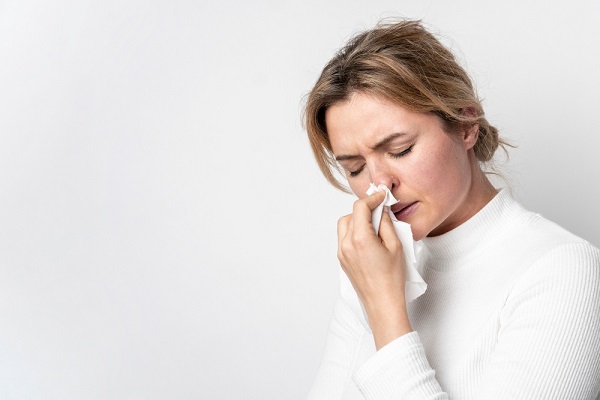How to Cure Epistaxis With the Help of Ayurveda?
- August 7, 2023
- admin

Epistaxis, commonly known as a nosebleed, can be a distressing experience for anyone. Whether it’s caused by dry air, allergies, sinus infections, or trauma, the sudden onset of bleeding from the nose can be alarming. While conventional medicine provides effective treatments for epistaxis, Ayurveda, the ancient system of traditional medicine from India, offers natural remedies that can help stop and prevent nosebleeds while addressing the underlying imbalances in the body. In this blog, we will explore the principles of Ayurveda and discover some effective remedies to cure epistaxis.
Understanding Ayurveda
Ayurveda is a holistic healing system that emphasizes the balance of energies within the body. According to Ayurvedic principles, the body is governed by three doshas – Vata, Pitta, and Kapha – representing different elements and qualities in the body. When these doshas are imbalanced, it can lead to various health issues, including nosebleeds.
The Causes of Epistaxis in Ayurveda
In Ayurveda, epistaxis is often associated with an aggravated Pitta dosha. Excessive heat in the body can cause inflammation and lead to the rupture of blood vessels in the nose. Additionally, dryness due to Vata imbalance can also make the nasal lining more susceptible to bleeding.
Ayurvedic Remedies for Epistaxis
-
Nasal Oil Application
Nasya, or the practice of applying medicated oils to nasal passages, is a powerful Ayurvedic remedy for epistaxis. Ayurvedic oils like Brahmi oil or coconut oil infused with cooling herbs like sandalwood can soothe the nasal tissues, reduce inflammation, and prevent further bleeding.
-
Cooling Diet
A cooling diet can help pacify an aggravated Pitta dosha. Include foods like cucumber, watermelon, coconut, and leafy greens in your diet. Avoid spicy, sour, and salty foods, as they exacerbate the Pitta imbalance.
-
Stay Hydrated
Drinking plenty of water is essential to keep the nasal passages moist and prevent dryness. Adequate hydration also helps maintain the balance of all three doshas.
-
Neti Pot Cleansing
Neti pot is a time-honored Ayurvedic practice that involves flushing the nasal passages with saline water. It can help remove irritants, pollutants, and excess heat from the nose, reducing the risk of nosebleeds.
-
Herbal Supplements
Ayurvedic herbs like Yashtimadhu (Licorice), Amla (Indian Gooseberry), and Guduchi (Giloy) are known for their cooling and anti-inflammatory properties. These herbs can be consumed in powder or capsule form to help balance Pitta and prevent nosebleeds.
-
Pranayama
Pranayama, or controlled breathing exercises, can help calm the mind and balance the doshas. Sheetali and Sheetkari pranayama are particularly beneficial in reducing excess heat and promoting a cooling effect in the body.
-
Lifestyle Modifications
Ayurveda emphasizes the importance of lifestyle choices in maintaining overall health. Avoid excessive exposure to the sun, practice stress-reducing techniques like yoga and meditation, and ensure you get enough restful sleep.
Preventive Measures for Epistaxis
Prevention is better than cure, and Ayurveda offers some preventive measures to reduce the chances of recurring nosebleeds:
-
Humidify the Air
Keep the indoor air moist, especially during dry seasons or in regions with low humidity. Use a humidifier or place water-filled bowls in your living spaces to prevent nasal dryness.
-
Nasal Protection
Inhaling pollutants or irritants can trigger nosebleeds. Wearing a mask or using a scarf to cover your nose can help protect it from external pollutants and allergens.
-
Avoid Nose-picking
Avoid picking your nose, as it can damage the delicate nasal tissues and lead to bleeding.
Conclusion
With its natural and holistic approach to healing, Ayurveda provides valuable remedies, herbs and medicines for managing and preventing epistaxis. By balancing the doshas and adopting a healthy lifestyle, we can promote overall well-being while effectively addressing nosebleeds. However, if the problem persists or worsens, it is crucial to consult a qualified Ayurvedic practitioner or healthcare professional for a comprehensive evaluation and personalized treatment plan. Embrace Ayurveda as a complementary approach to conventional medicine, and experience the transformative healing it can bring to your life.
How to Use Ayurvedic Toners and Cleansers for Acne-Prone Skin
How Ayurvedic Medicine Restores Gut Health for Acid Reflux Patients
How Can We Reduce Flatulence Problems With the Help of Ayurveda?
5 Effective Ayurvedic Herbs for Pleurisy Treatment
The Role of Patanjali Medicine in Preventing & Managing Epistaxis
Disclaimer:
This website is not an official website of Swami Ramdev and Divya pharmacy or Patanjali Yog Peeth, Haridwar. It is a health information website. Authenticity and genuinety of the information mentioned on the above page is purely at the user discretion. We don't claim any cure, relief and other authenticity of the medical and health conditions that are mentioned on the above page. It is always recommended that users of this website should always consult their physician prior to use of this information and products. The products and information listed above is not being evaluated by US FDA. This Website is presented purely at our personal experience and hence we don’t take any responsibility of any sort.









